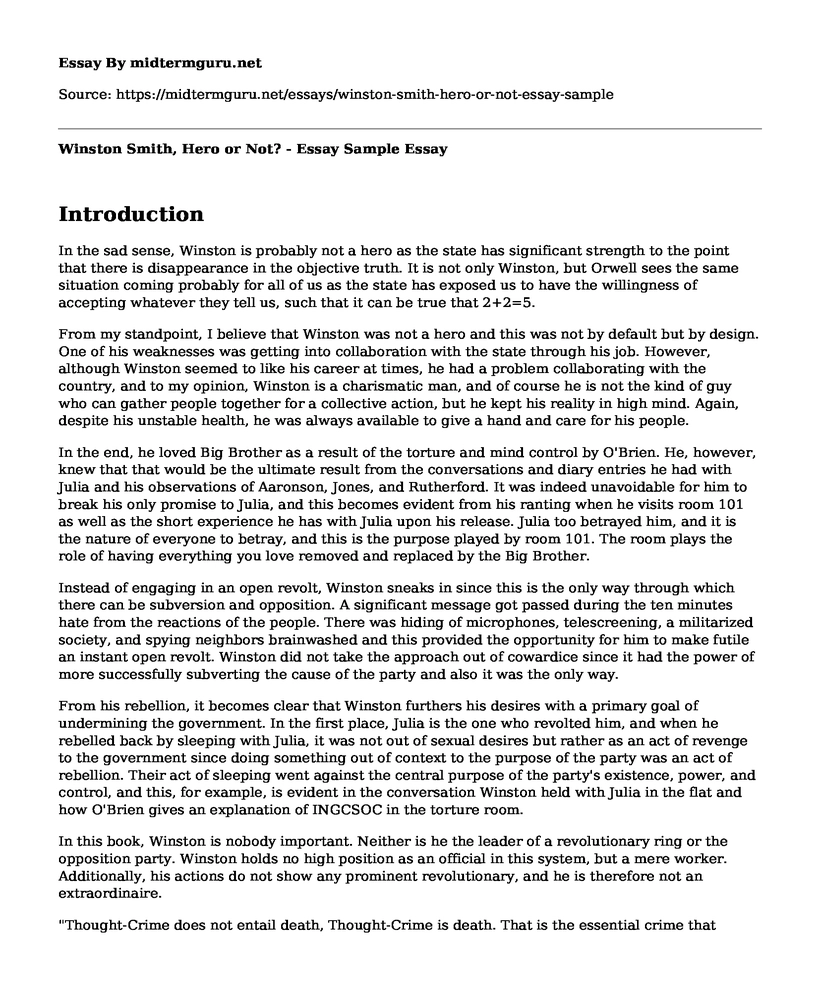Introduction
In the sad sense, Winston is probably not a hero as the state has significant strength to the point that there is disappearance in the objective truth. It is not only Winston, but Orwell sees the same situation coming probably for all of us as the state has exposed us to have the willingness of accepting whatever they tell us, such that it can be true that 2+2=5.
From my standpoint, I believe that Winston was not a hero and this was not by default but by design. One of his weaknesses was getting into collaboration with the state through his job. However, although Winston seemed to like his career at times, he had a problem collaborating with the country, and to my opinion, Winston is a charismatic man, and of course he is not the kind of guy who can gather people together for a collective action, but he kept his reality in high mind. Again, despite his unstable health, he was always available to give a hand and care for his people.
In the end, he loved Big Brother as a result of the torture and mind control by O'Brien. He, however, knew that that would be the ultimate result from the conversations and diary entries he had with Julia and his observations of Aaronson, Jones, and Rutherford. It was indeed unavoidable for him to break his only promise to Julia, and this becomes evident from his ranting when he visits room 101 as well as the short experience he has with Julia upon his release. Julia too betrayed him, and it is the nature of everyone to betray, and this is the purpose played by room 101. The room plays the role of having everything you love removed and replaced by the Big Brother.
Instead of engaging in an open revolt, Winston sneaks in since this is the only way through which there can be subversion and opposition. A significant message got passed during the ten minutes hate from the reactions of the people. There was hiding of microphones, telescreening, a militarized society, and spying neighbors brainwashed and this provided the opportunity for him to make futile an instant open revolt. Winston did not take the approach out of cowardice since it had the power of more successfully subverting the cause of the party and also it was the only way.
From his rebellion, it becomes clear that Winston furthers his desires with a primary goal of undermining the government. In the first place, Julia is the one who revolted him, and when he rebelled back by sleeping with Julia, it was not out of sexual desires but rather as an act of revenge to the government since doing something out of context to the purpose of the party was an act of rebellion. Their act of sleeping went against the central purpose of the party's existence, power, and control, and this, for example, is evident in the conversation Winston held with Julia in the flat and how O'Brien gives an explanation of INGCSOC in the torture room.
In this book, Winston is nobody important. Neither is he the leader of a revolutionary ring or the opposition party. Winston holds no high position as an official in this system, but a mere worker. Additionally, his actions do not show any prominent revolutionary, and he is therefore not an extraordinaire.
"Thought-Crime does not entail death, Thought-Crime is death. That is the essential crime that contains all others in itself." My reason for quoting this is because, in every small revolutionary action by Winston, this is his driving force. He firmly believes he cannot turn off his brain, and Winston cannot grab the point when O'Brien explains to him that he must not just say that 2+2=5 but instead have to understand it. Throughout the book, Winston proves that it is a revolutionary act to write in a notebook, as useless and straightforward as it is; that it is a revolutionary act to buy the paperweight; that it is a revolutionary act to recognize the beauty of the woman in the proletarian song; it is a revolutionary act to rent that house, it is a revolutionary act to be Julia's lover; and that it is a revolutionary act to remember the church rhymes about the church bells.
However, these are small and useless actions from which he should not derive his hope. They are actions that can never be used in overthrowing the government, but only to keep his mind at freedom.
To recap on this, at first, Winston and Julia believe that it is impossible to access their hearts and minds. In the end, however, O'Brien proves them wrong through the negation of everything they have done. The fact causes material consequences to Winston as he never manages to initiate any revolution nor to manage to escape. Besides, he also loses this one thing he has been keeping throughout his entire life, and this is the freedom of feeling and the freedom of mind.
Cite this page
Winston Smith, Hero or Not? - Essay Sample. (2022, Dec 21). Retrieved from https://midtermguru.com/essays/winston-smith-hero-or-not-essay-sample
If you are the original author of this essay and no longer wish to have it published on the midtermguru.com website, please click below to request its removal:
- About a Boy by Nick Hornby: Two Essays
- Essay on The Tower of The Elephant By Robert E Howard
- Comparison of Two Heroes: Gilgamesh and Odyssey
- Essay Sample: What Does Arnold Friend Represent In Where Are You Going, Where Have You Been
- "Lord of the Flies" Literary Analysis Essay
- The Sirens in Odysseus - Literary Analysis Essay
- Critical Essay on "The Tragedy of Julius Caesar" by William Shakespeare







